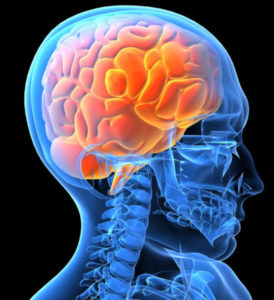If we want to understand how to keep our aging brains healthy, we must understand inflammation. It is key to our abili ty to fight off infections, but chronic inflammation is implicated in obesity, diabetes, cancer, depression, autism, asthma, arthritis, coronary artery disease, multiple sclerosis, Parkinson’s, and Alzheimer’s disease. Inflammation can destroy neurons.
ty to fight off infections, but chronic inflammation is implicated in obesity, diabetes, cancer, depression, autism, asthma, arthritis, coronary artery disease, multiple sclerosis, Parkinson’s, and Alzheimer’s disease. Inflammation can destroy neurons.
How can the body’s natural immune response end up complicit in so many diverse diseases that affect aging seniors? The story is complicated. But the better we understand it, the better we can control it with diet and exercise. An anti-inflammatory diet, for example, is key. A few good habits today will pay off in better brain health as we age.
Inflammation is exactly what is happening in the brain of a patient with Alzheimer’s disease. We don’t see it and the brain doesn’t experience pain, but it is the fundamental process that underlies the development of this devastating illness.
There is a strong case for looking at inflammation as contributing to headaches, brain fog, memory deficits, and mood disorders. Scientists are now showing that it is a major factor in mental illnesses. A lot of inflammation has to do with the state of your microbiome, your gut bacteria. But to understand the gut-brain connection, first, let’s explore the role of inflammation.
Good Inflammation Fights Germs and Heals
We’re all familiar with red and swollen skin after a bite or injury. That is inflammation at work. The immune system sends special blood and immune cells to repair the damage and mop up debris. To understand how such a normal reparative process can bring about brain disease, I turned to Dr. David Perlmutter’s book called Brain Maker: The Power of Gut Microbes to Heal and Protect Your Brain for Life.
Inflammation in the Aging Brain
In Alzheimer’s patients, biochemicals that indicate that inflammation is occurring—inflammatory markers—are elevated and can even be used to predict cognitive decline and the development of dementia. Among the most famous of these biochemicals are the cytokines, small proteins released by cells that affect the behavior of other cells, and are often important participants in the inflammatory process. C-reactive protein, interleukin six (IL-6), and tumor necrosis factor-alpha (TNF-α) are all cytokines.
A laboratory blood test often measures C-reactive protein levels. This indicates inflammation in your body. We now have the ability to image the brain in ways that allow us to see these inflammatory chemicals in action, so we can identify direct correlations between the degree of inflammation and the degree of cognitive impairment.
Blood Sugar and Inflammation
One of the ways you can keep inflammation in check when it’s not needed is by maintaining healthy blood sugar levels. I wrote about that last week: Blood Sugar and the Aging Brain. Elevated blood sugar signals inflammation in the bloodstream, as excess sugar is toxic if not swept up and used by cells.
Rigorous studies show a strong correlation between high blood sugar and the risk of dementia. Even slight elevations of blood sugar that are below the diabetes range have been shown to significantly increase the risk for dementia (which is untreatable, for the most part). This is why it’s important to monitor your blood glucose and HA1c on your lab results.
Remember the time to take protective actions against the development of Alzheimer’s and other neurodegenerative impairments is at least a decade before you reach the age that symptoms would appear. That means sooner rather than later.
Here’s what Dr. Perlmutter reminds us:
Sadly, medical researchers already have the knowledge that, if implemented, could slash the number of new Alzheimer’s patients here in the U.S. by more than half.
Few, if any, opportunities exist to monetize such nonproprietary interventions like diet and exercise, which, among other lifestyle strategies, are well known to play important roles in both brain degeration and, on the other hand, preservation.
Follow a Low Carbohydrate Diet
Eat too many refined sugars and carbs (wheat, pasta) and as we age, we lose the ability to control blood sugar. This paves the way toward brain decay as it becomes inflamed. Take away excess sugar and carbohydrates in your diet, and the inflammation calms down.
It’s not that difficult to switch your eating habits to a low carbohydrate diet. A Mediterranean diet (minus the pasta and bread) is an example of a heart and a brain-healthy way to eat. A study showing that elderly people who added more fat, in the form of olive oil or mixed nuts, to their diets maintained their cognitive function over a six-year period much better than people who ate a low-fat diet.
Disease prevention through non-invasive lifestyle habits seems too simple. People want a magic pill. And pharmaceutical companies are all too happy to spend millions to develop one and pass the costs on to consumers. So far, they haven’t come up with any medicine to cure dementia in spite of trying.
3 Steps to Lower Inflammation in the Aging Brain
Here are three healthy habits we can adopt as a defense against inflammation and brain decay:
- Follow an anti-inflammatory diet high in fish, vegetables, nuts, seeds, and healthy fats such as olive oil. Make sure you get plenty of food rich in anti-oxidant vitamins A, C, E, and D. Ensure you’re getting enough B-12.
- Supplementation with omega-3 DHA from fish or algae.
- Exercise routinely.
It’s time we pay attention to the science and start building better health habits. Before it’s too late. Once dementia sets in, there’s no turning back.

Recent Comments